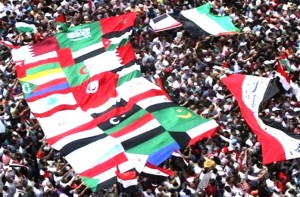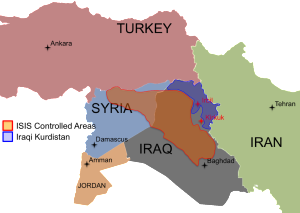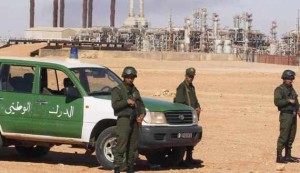There is a lot of soul-searching nowadays regarding the origins of the Islamic State of Iraq and the Levant (ISIL). Historians and political scientists of all sorts have logged a lot of air time and print space answering the questions: “How could ISIL have happened and where did these savages come from?” Their answer is almost always a history lesson of the Iraq war with the occasional biopic on the Assad family thrown in for balance. Very rarely do they explore ISIL’s roots beyond that so there is something missing in the coverage. While the post-2011 situation in Iraq undoubtedly led to the conception and birth of ISIL, let us remember that the group grew up in Syria. For those of us paying attention then, our thoughts on the genesis of ISIL must inevitably turn to the Arab Spring and its mishandling by the Obama Administration and others.

Leading from Behind
We all know the mixed history of the Arab Spring. On one hand it promised to liberate political thought in the Middle East from its despotic modern history but on the other led to the jarring realization that Islamism may indeed come to US allies like Egypt through the ballot box. The Obama Administration should have learned a lesson from the electoral victory of Hamas but instead meekly transmitted mixed messages of support for America’s distasteful but stable ally Mubarak. On 11 February 2011, Egypt announced Mubarak’s resignation while other regional allies watched in horror as America abandoned the second-largest recipient of US military aid. Four days later, as if on cue, violence erupted at Arab Spring protests in Benghazi, Libya, igniting the civil war that ultimately led to the ignominious downfall of Muammar Ghaddafi and the slow descent of the country into perpetual balkanized dysfunction. Less than three weeks after the first shots were fired in Benghazi, Britain and France were rushing headlong into the fray, enforcing a no fly zone and bombing Ghaddafi’s forces on the ground. To support this they waved the flag of humanitarian intervention but found themselves critically limited in two ways: by their own inability to sustain a protracted air campaign in Africa, and by the insistence of the Obama Administration to “lead from behind” and achieve victory through airpower.
 In what must be one of history’s most stunning examples of the costs of alliance politics, the United States very quickly found itself compelled to rescue its allies from spectacular failure in a campaign it was verbally supporting. Constrained by the President’s refusal to lead from the front, the United States Military took the reins under the guise of a NATO intervention while the French and British happily withdrew to the familiar position of supporting a US-led military endeavor America never wanted and did not benefit from. In Libya, the rest is history. Freed from control of the Ghaddafi regime and armed by a flood of loose weaponry, groups like Al Qaeda in the Islamic Maghreb (AQIM) unleashed direct assaults on governments across northern Africa. As I argue in “The Illusion of Suddenness“, The infectious cocktail of successful rebellion in Egypt and weaponry from Libya transformed another Arab Spring protest, this time in Syria, into a raging insurgency. The stage was set for ISIL to come of age.
In what must be one of history’s most stunning examples of the costs of alliance politics, the United States very quickly found itself compelled to rescue its allies from spectacular failure in a campaign it was verbally supporting. Constrained by the President’s refusal to lead from the front, the United States Military took the reins under the guise of a NATO intervention while the French and British happily withdrew to the familiar position of supporting a US-led military endeavor America never wanted and did not benefit from. In Libya, the rest is history. Freed from control of the Ghaddafi regime and armed by a flood of loose weaponry, groups like Al Qaeda in the Islamic Maghreb (AQIM) unleashed direct assaults on governments across northern Africa. As I argue in “The Illusion of Suddenness“, The infectious cocktail of successful rebellion in Egypt and weaponry from Libya transformed another Arab Spring protest, this time in Syria, into a raging insurgency. The stage was set for ISIL to come of age.
The Birth of ISIL
As the war in Syria intensified, the United States continued to display hesitation in its foreign policy. With the Assad regime clinging desperately to survival, western governments began to grow concerned about the potential for its use of chemical weapons. At a 20 August 2012 press conference, the President of the United States, who seemed to have recovered from his earlier lack of conviction in regional affairs, delivered a clear and powerful deterrent threat to Damascus by drawing a “red line” against the use of chemical weapons in the conflict. But as a string of mysterious chemical weapons began exploding in rebel-held neighborhoods in October of that year, the “red line” began to bend and eventually broke in August 2013 after the undeniable use of Sarin in the town of Ghouta. Rather than use authority under the War Powers Resolution to defend the “red line”, the President sought and received a specific resolution from Congress on 6 September which, among other things, required him to use “all appropriate diplomatic and other peaceful means to prevent the deployment and use of weapons of mass destruction by Syria”. In this he complied with further delay, announcing that air strikes could be averted if Syria were to give up its chemical stockpiles. Sensing an opportunity, Russia sent its Foreign Minister to negotiate the handover, managing by his success to destroy what little deterrent credibility the United States had left in the region.

The ISIL assault on Iraq began predictably three months later with the fall of al Qaim in December. By the end of February 2014, Fallujah and Ramadi, taken at such cost by American soldiers ten years earlier, were firmly in Islamist hands. In June, ISIL attacked the Tigris river valley, taking Mosul on the 10th and Tikrit the next day. By the end of the month, large formations of the Iraqi Army had been completely destroyed, Tal Afar was in ISIL hands, and both Syria and Iran were actively intervening in Iraq. Even then, America held off taking action until ISIL’s slaughter of Yezidis in Sinjar and simultaneous advance on the Kurdish capital Irbil. By this time, ISIL controlled all the major cities in the north and west of Iraq, the Kurds were on the verge of being shattered into four exiled refugee communities, Baghdad was surrounded on two sides, and Iran was intervening openly in the situation. The specter of state on state sectarian war was becoming very real indeed as the buffer between traditional enemies Iran and Saudi Arabia was collapsing precisely as Washington’s resolve was in serious doubt.
A Silver Lining?
The chronology of this is as disheartening as it is hard to deny. A series of American half measures, broken promises, and false threats is the real root of all ISIL in the Middle East. Faced with nothing but bad options, the White House now finds itself fighting shoulder to shoulder in Iraq with its old enemy, the Quds Force. Meanwhile, Riyadh has felt compelled to build an independent coalition (read: without the USA) to wage open war against Iranian proxies on their Yemeni frontier leading to the possibility that once again, the United States will get dragged into a conflict it doesn’t want in order to rescue an ally from failure. Egypt, Qatar, and the UAE have all conducted offensive military strikes against ISIL and Arab Spring-related forces in the last five years, and large rifts are developing between the United States and critical allies Turkey and Israel. If there is a silver lining to the quickening foreign policy disaster in the Middle East, it is that the crisis has given Tehran and Washington an opening to start talking about the Iranian nuclear program. One gets the sense however, that the rapprochement comes amid declining American leverage rather than the reverse.
Lino Miani is a retired US Army Special Forces officer, author of The Sulu Arms Market, and CEO of Navisio Global LLC.




